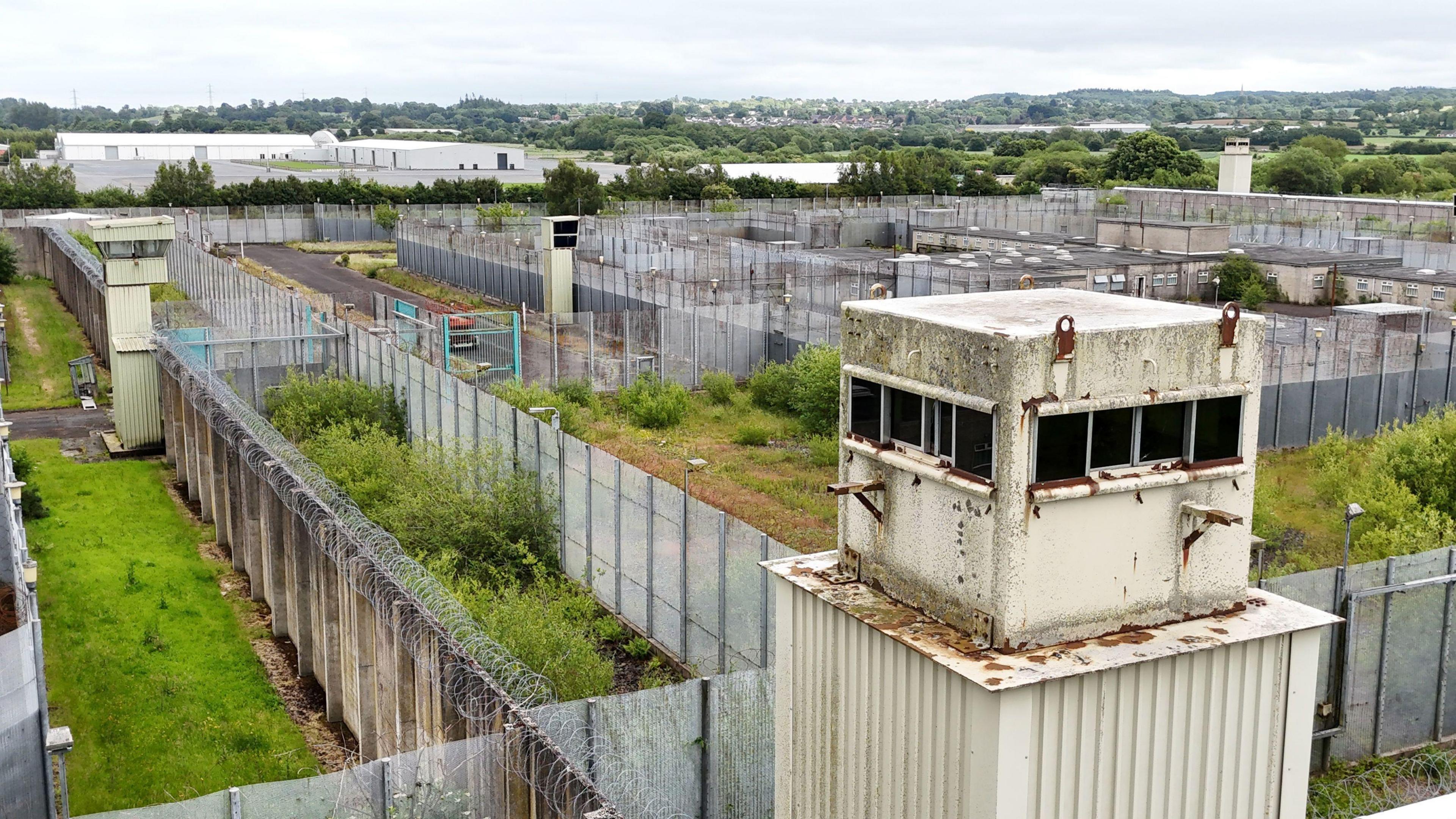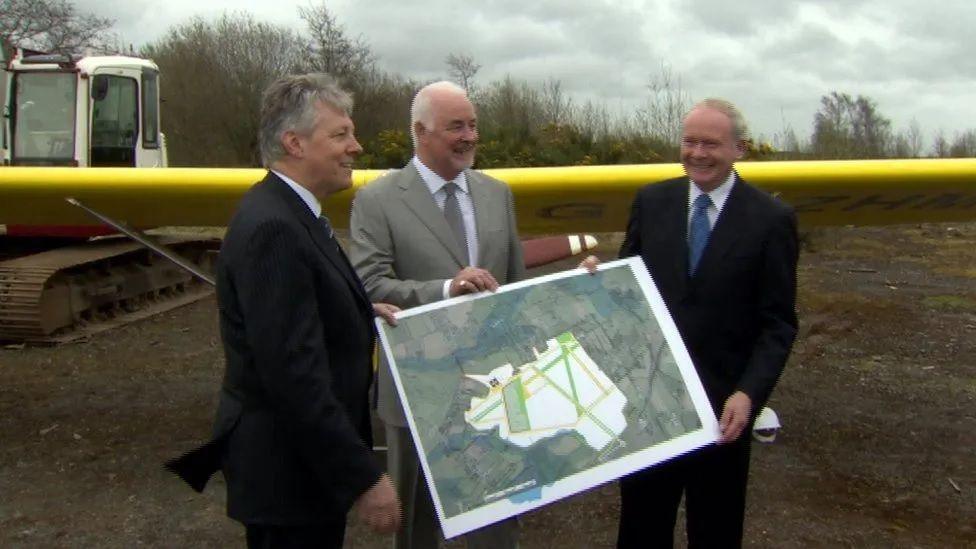Maze prison will never be shrine - DUP minister

The former Maze prison near Lisburn closed in 2000
- Published
There will "never be a shrine” at the site of the former Maze prison, a Democratic Unionist Party (DUP) minister has said.
Paul Givan's party blocked plans to build a peace centre at the Maze in 2013 over claims the site would become a "shrine to terrorism".
More than a decade on, the body in charge of Northern Ireland museums has been in recent talks about the future of the derelict jail.
National Museums NI said it had discussed what role it could play in the "interpretation of and access to" the former prison. Stormont's Executive Office said "no decisions have yet been made".
'My father served as a prison officer'
The high-security jail held paramilitary prisoners during the decades-long conflict in Northern Ireland known as the Troubles.
It was the site of the republican hunger strikes in 1981 during which 10 inmates starved themselves to death.
"Of course there is a way to manage our past, but there will never be a shrine at the Maze Prison - that’s not going to happen," Mr Givan told the BBC's Nolan Show.
The DUP assembly member, who is now Northern Ireland's minister for education, is the son of a former Maze prison officer.
“I come from this where my father served as a prison officer for 36 years", he said.
“He worked in the H-blocks with Provisional IRA prisoners, with loyalist prisoners.
“He was there during the hunger strike. He was there whenever Bobby Sands died.
“So I know personally what is involved whenever you served in the Maze prison - the threat that you were under."
Mr Givan recalled one incident where the windows were blown out in his family home.
He also said his father "checked under his car before every single journey" due to fears of attack.

DUP Education Minister Paul Givan spoke of his own family's experience
A planned £300m redevelopment of the site has been in limbo after the political row.
Most buildings at the prison have been demolished, but some were retained.
In August 2013, Stormont's then first minister Peter Robinson, of the Democratic Unionist Party (DUP), blocked a plan to build a peace centre on the site.
It was set to be part of a major redevelopment of the wider 347-acre ground - one of Northern Ireland's largest development sites in public ownership.
Sinn Féin's Martin McGuinness, the then deputy first minister, later said that no further development would take place until the dispute was resolved.
Since then, the stalemate has led to many requests to visit the prison buildings being refused by the Executive Office (TEO) - the first and deputy first ministers' joint government department.
Analysis: Museums input could unlock Maze potential
It was meant to be a beacon of peace and prosperity, but has been stuck in a political stand-off.
Eleven years have passed since Peter Robinson's letter from Florida halting plans for a peace centre at the former Maze prison site.
As Stormont's first minister, he had faced pressure from unionist rivals who claimed it would become a "shrine to terrorism".
Some parts of the sprawling site near Lisburn have been put to use.
The annual agricultural event, the Balmoral Show, has been held there since 2013, while Northern Ireland's Air Ambulance also operates from the site.
But there has long been a political stalemate over a wider regeneration plan, which the site's development body has said could bring about £800m of investment and up to 14,000 jobs.
National Museums NI has experience of sensitively handling exhibitions and events about Northern Ireland's divisive and troubled past.
No firm plans are yet on the table, but its input could help unlock the site's full potential.

Former first and deputy first ministers Peter Robinson and Martin McGuinness in 2013 with Terence Brannigan, former chair of the Maze Long Kesh Development Corporation
In April, senior officials from National Museums NI (NMNI) met the Maze Long Kesh Development Corporation (MLKDC) - set up in 2012 to redevelop the site.
A "draft partnership agreement" between the two bodies is "in development", according to minutes of the meeting.
It was noted the arrangement could "only be activated once there was political agreement on the way forward".
On the former prison site, it was noted an NMNI official "highlighted the need for a political mandate to allow NMNI to manage this under agreed criteria".
NMNI, which is responsible for sites including Belfast's Ulster Museum, has many years of experience of delivering Troubles-related exhibitions and events.
A spokeswoman said: "It is our understanding that the Maze Long Kesh Development Corporation has been tasked with exploring options for the future development of the site.
"Within that context we have discussed what, if any, role we could play in supporting the interpretation of and access to the heritage buildings, including the Second World War hangars and the prison buildings.
"This would be as an extension of our relevant work at our museums. However, any decisions on the future of the site rest solely with executive ministers."
'Jobs for the future'
First Minister Michelle O'Neill and Deputy First Minister Emma Little-Pengelly recently met the MLKDC board to discuss the "huge potential" of the site, the Executive Office said.
"No proposals have been put to TEO for consideration in relation to NMNI. No decisions have yet been made about the future of the site," said a spokesperson.
Bryan Gregory, interim chief executive of the MLKDC, said it was "continuing to explore options" for regenerating the site.
Alliance Party MP Sorcha Eastwood called for greater efforts to reach an agreement.
"The stock response of acknowledging the potential but doing nothing can no longer hold," she said.
"Now is the time for plans, timelines and political commitment.
"Given the recent government announcement about GB Energy, the site could play a major role in green skills and upskilling people for jobs for the future."